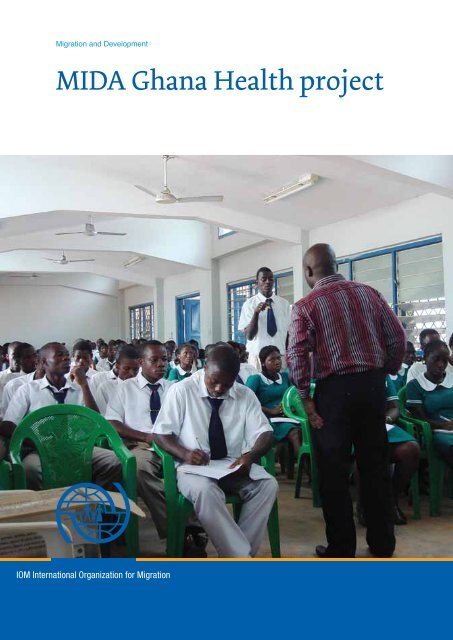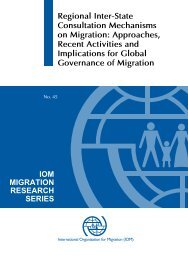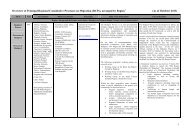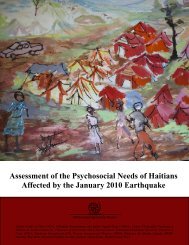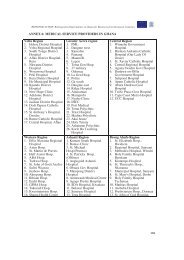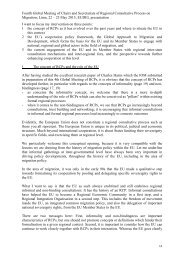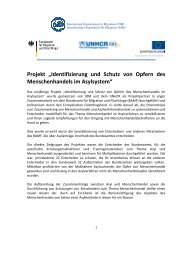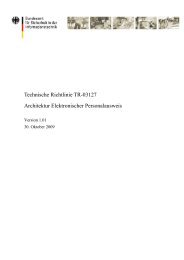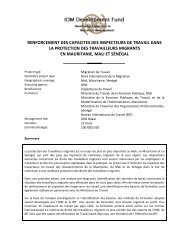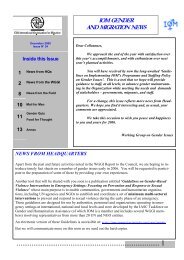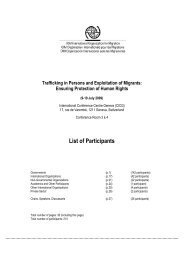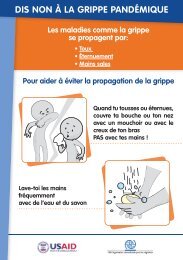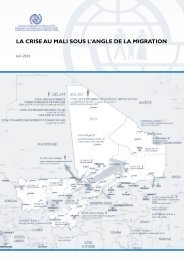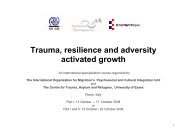MIDA Ghana Health project - International Organization for Migration
MIDA Ghana Health project - International Organization for Migration
MIDA Ghana Health project - International Organization for Migration
Create successful ePaper yourself
Turn your PDF publications into a flip-book with our unique Google optimized e-Paper software.
<strong>Migration</strong> and Development<br />
<strong>MIDA</strong> <strong>Ghana</strong> <strong>Health</strong> <strong>project</strong><br />
IOM <strong>International</strong> <strong>Organization</strong> <strong>for</strong> <strong>Migration</strong>
<strong>Migration</strong> <strong>for</strong> the benefit of all<br />
Established in 1951, IOM is the leading inter governmental organization in the field<br />
of migration and works closely with governmental, inter-governmental and<br />
non-governmental partners.<br />
IOM in the Netherlands assists migrants with voluntary return to their country of<br />
origin and sustainable reintegration. IOM also arranges the travel of invited refugees<br />
and family members that have received authorization to be reunited with their<br />
families in the Netherlands. As a third activity, IOM facilitates qualified migrants<br />
who reside in the Netherlands to help with the development or reconstruction of<br />
their country of origin through temporary return <strong>project</strong>s.
Introduction<br />
MIgratIon & developMent<br />
Maximizing the positive relationship between<br />
migration and development has long been<br />
a focus of the work of the <strong>International</strong><br />
<strong>Organization</strong> <strong>for</strong> <strong>Migration</strong> (IOM).<br />
This is especially relevant in an era of<br />
globalization and unprecedented mobility.<br />
The objective of IOM’s migration and<br />
development programme is to contribute<br />
to the work of the international community,<br />
in particular to harness the development<br />
potential of the diaspora <strong>for</strong> the benefit<br />
of their native country and to contribute<br />
to sustainable development and poverty<br />
reduction.<br />
MIgratIon & developMent<br />
The <strong>Migration</strong> <strong>for</strong> development in Africa<br />
(<strong>MIDA</strong>) initiative links the skills and<br />
expertise in the diaspora to the development<br />
of home countries. The <strong>MIDA</strong> <strong>Ghana</strong> <strong>Health</strong><br />
<strong>project</strong> aims to build a bridge between<br />
available resources of the <strong>Ghana</strong>ian diaspora<br />
and needs, opportunities and policies in the<br />
health sector in <strong>Ghana</strong>.<br />
The main purpose of the <strong>project</strong> is to facilitate<br />
the temporary return to <strong>Ghana</strong> of <strong>Ghana</strong>ian<br />
health professionals from the diaspora<br />
residing in the Netherlands, United Kingdom,<br />
Germany and other EU countries <strong>for</strong> the<br />
benefit of local health institutions.<br />
InternatIonal organIzatIon <strong>for</strong> MIgratIon the netherlands<br />
MIda ghana health <strong>project</strong><br />
1<br />
The <strong>MIDA</strong> <strong>Ghana</strong> <strong>Health</strong> <strong>project</strong> is funded by<br />
the Dutch government through the Embassy<br />
of the Kingdom of the Netherlands in Accra.<br />
IOM’s temporary return <strong>project</strong>s:<br />
– are flexible and demand driven based on<br />
identified needs and gaps in priority<br />
sectors of countries of origin;<br />
– work actively with the diaspora and its<br />
resources and networks;<br />
– facilitate contacts and cooperation between<br />
the diaspora and their home countries and<br />
strongly focus on building capacity of<br />
stakeholders in countries of origin;<br />
– stimulate cooperation and partnerships<br />
between institutions in countries of<br />
origin and knowledge institutes in the<br />
Netherlands and other EU countries.<br />
The <strong>MIDA</strong> <strong>Ghana</strong> <strong>Health</strong> <strong>project</strong> is financed by<br />
the Netherlands Embassy in <strong>Ghana</strong> and is realised<br />
in close cooperation with the Ministry of <strong>Health</strong> in<br />
<strong>Ghana</strong>.
InternatIonal organIzatIon <strong>for</strong> MIgratIon the netherlands<br />
MIda ghana health <strong>project</strong><br />
2<br />
dr. paul o<strong>for</strong>i-atta, an orthopaedic surgeon from the United Kingdom (back to camera) explains issues<br />
on x-ray to medical health professional at the vra hospital in akosombo.
contents<br />
MIda ghana health <strong>project</strong><br />
IoM the netherlands 4<br />
netherlands embassy:<br />
appeal to ghana government 5<br />
IoM the hague and IoM accra 6<br />
IntervIew <strong>project</strong> partner<br />
Ministry of <strong>Health</strong> in <strong>Ghana</strong>:<br />
a committed government 9<br />
IntervIews host organIzatIons<br />
Col.dr. Samuel Offei Awuku:<br />
“A great impact on our hospital” 10<br />
Bernard Botwe:<br />
“Establishing a strategic fit” 11<br />
Dr. Rebecca Acquaah-Arhin:<br />
“The quality of our patient care<br />
has greatly improved” 12<br />
Dr. Ken Sagoe:<br />
“Bringing back much needed<br />
expertise into the health sector” 13<br />
InternatIonal organIzatIon <strong>for</strong> MIgratIon the netherlands<br />
assIgnMent storIes<br />
MIda ghana health <strong>project</strong><br />
3<br />
Clement Jafani Nabare:<br />
“Whenever I return to <strong>Ghana</strong>,<br />
I see great improvement” 16<br />
Dr. Paul O<strong>for</strong>i-Atta:<br />
“Make the brain drain work to our<br />
advantage” 17<br />
Clement Adu Twum:<br />
“I wanted to see how I could be<br />
of service” 18<br />
Hagar Amponsah:<br />
“You start with something little,<br />
and then it grows” 19<br />
InternshIp storIes<br />
Yaa Ntiriwaa Danso:<br />
“Many people benefit from my<br />
internship” 22<br />
Dr. Akosua Hemeng:<br />
“Building a strong national work<br />
<strong>for</strong>ce of clinicians” 23<br />
results 24
InternatIonal organIzatIon <strong>for</strong> MIgratIon the netherlands<br />
MIda ghana health <strong>project</strong><br />
4<br />
MIda ghana health <strong>project</strong><br />
IoM the netherlands<br />
MIda ghana health <strong>project</strong><br />
The <strong>MIDA</strong> <strong>Ghana</strong> <strong>Health</strong> <strong>project</strong> contributes<br />
to the development of human resources in<br />
the health sector in <strong>Ghana</strong>. <strong>Ghana</strong>ian and<br />
other African migrants in EU countries can<br />
transfer knowledge, skills and experience<br />
through temporary assignments to <strong>Ghana</strong>.<br />
Also, health workers from <strong>Ghana</strong> have<br />
the opportunity to engage in specialized<br />
training at health care institutions in<br />
the Netherlands, Germany or the United<br />
Kingdom.<br />
The <strong>project</strong> is implemented by IOM in close<br />
cooperation with the Ministry of <strong>Health</strong> of<br />
<strong>Ghana</strong> and <strong>Ghana</strong>ian diaspora groups in<br />
Europe.<br />
The <strong>MIDA</strong> <strong>Ghana</strong> <strong>Health</strong> <strong>project</strong> started in<br />
2002 and finishes in December 2012.<br />
The <strong>project</strong> was linked to the five-year<br />
Human Resources Policies & Strategies<br />
(HRPS) <strong>for</strong> the <strong>Health</strong> Sector 2007-2011,<br />
as defined by the Ministry of <strong>Health</strong> of<br />
<strong>Ghana</strong>. The <strong>project</strong> consists of three main<br />
components:<br />
1 IOM facilitated temporary return<br />
assignments to <strong>Ghana</strong> carried out by<br />
qualified <strong>Ghana</strong>ian health professionals<br />
from the diaspora residing in the<br />
Netherlands, the United Kingdom and<br />
Germany.<br />
2 IOM facilitated internships abroad<br />
<strong>for</strong> qualified health workers from <strong>Ghana</strong>.<br />
The internships took place in hospitals<br />
and other health educational institutions<br />
in the Netherlands, the United Kingdom<br />
or Germany.<br />
3 IOM and the Ministry of <strong>Health</strong> of <strong>Ghana</strong><br />
undertook an assessment into the<br />
option of facilitating long-term returns of<br />
members from the diaspora to the health<br />
sector in <strong>Ghana</strong>.
InternatIonal organIzatIon <strong>for</strong> MIgratIon the netherlands<br />
MIda ghana health <strong>project</strong><br />
5<br />
netherlands embassy: appeal to<br />
ghana government<br />
The Netherlands Embassy in <strong>Ghana</strong> has<br />
been involved in, and the main sponsor of,<br />
the <strong>MIDA</strong> <strong>Ghana</strong> <strong>Health</strong> <strong>project</strong> since its<br />
start in 2005. Alexander van Ommen,<br />
the Embassy’s <strong>Health</strong> and Gender Adviser:<br />
“Our Embassy plays an important financial<br />
role, as the Dutch government is responsible<br />
<strong>for</strong> the main part of the <strong>project</strong>’s funding.<br />
Additionally, we have been providing<br />
technical support and have used our<br />
network to promote <strong>MIDA</strong>’s visibility with<br />
parties such as <strong>Ghana</strong>ian government<br />
officials and health services.”<br />
BraIn draIn<br />
Mr. Van Ommen praises the idea behind<br />
the <strong>project</strong>, which he says, “ideally could<br />
contribute to putting a stop to the brain<br />
drain, with medical staff leaving <strong>Ghana</strong> <strong>for</strong><br />
Europe and the United States. It is essential<br />
that this brain drain is turned into a brain<br />
gain, bringing the much-needed expertise of<br />
alexander van ommen:<br />
“the <strong>project</strong> helped to open<br />
up the discussion needed to<br />
improve the health sector”<br />
motivated, well-educated health personnel<br />
back within <strong>Ghana</strong>’s borders. In this respect,<br />
the <strong>Ghana</strong>ian government could make a<br />
stronger moral appeal to those involved in<br />
the diaspora to stimulate their involvement.<br />
Their country needs these men and women.”<br />
stIMUlatIng cIrcUlar<br />
MIgratIon<br />
Although the <strong>MIDA</strong> <strong>Ghana</strong> <strong>Health</strong> <strong>project</strong><br />
ends in December 2012, the <strong>project</strong> has s<br />
erved to place circular migration (migrants<br />
temporarily returning to their home country,<br />
making their knowledge and network<br />
available. Ed.) higher on the national agenda.<br />
Alexander van Ommen: “In a way, it has<br />
played an important part in opening up the<br />
discussion that is needed to improve the<br />
health sector’s situation.”
InternatIonal organIzatIon <strong>for</strong> MIgratIon the netherlands<br />
MIda ghana health <strong>project</strong><br />
6<br />
IoM the hagUe and IoM accra<br />
stimulating linkages between<br />
migration and development<br />
More and more migrants and migrant<br />
organizations are becoming actively involved<br />
in the development of their countries of<br />
origin. Despite the economic crisis, the<br />
amount of money alone which migrants<br />
transfer to family at home each year makes<br />
this relationship very visible. The strength of<br />
the ties is also apparent in IOM’s temporary<br />
return <strong>project</strong>s.<br />
IOM the Netherlands has received positive<br />
reactions to the temporary assignment of<br />
highly qualified migrants to their countries<br />
of origin. Both the migrants and the<br />
organizations in those countries, as well as<br />
the donors of the <strong>project</strong>s, are positive about<br />
the results so far. More research is required<br />
however, into the many relationships between<br />
migration and development and also into the<br />
long-term effects as, <strong>for</strong> example, reduction<br />
of poverty and economic development.<br />
creatIng networKs and<br />
connectIons<br />
The <strong>MIDA</strong> <strong>Ghana</strong> <strong>Health</strong> <strong>project</strong> is demand<br />
driven and based on identified needs in<br />
<strong>Ghana</strong>. IOM The Hague works closely with<br />
IOM Accra and local stakeholders in linking<br />
the needs with the available experience,<br />
expertise and networks of migrants residing<br />
in the Netherlands and in other European<br />
countries. IOM acts as a facilitator between<br />
diasporas and organizations in <strong>Ghana</strong><br />
and the Netherlands. “IOM is <strong>for</strong>emost a<br />
bridge builder,” says Dyane Epstein, Chief of<br />
Mission of IOM Accra.<br />
“We bring together governments, migrants<br />
and other key stakeholders such as hospitals<br />
and health professionals. Here in <strong>Ghana</strong> we<br />
see a good example of bridge building in the<br />
<strong>MIDA</strong> <strong>Ghana</strong> <strong>Health</strong> <strong>project</strong>. Not only does<br />
IOM create networks and connections, the<br />
migrants themselves act as bridges. They<br />
develop links with their home country that<br />
often grow stronger with the years.”<br />
IOM plays an active role in facilitating contacts<br />
between the diaspora and the <strong>Ghana</strong>ian<br />
government. Ms Epstein explains:<br />
“Of course without IOM there would also<br />
be <strong>project</strong>s by migrants. But then smaller<br />
groups of people would be operating on an<br />
individual basis. With our assistance,<br />
various ef<strong>for</strong>ts can be combined and<br />
coordinated, resulting in a much greater<br />
impact, with many more people benefitting.”<br />
playIng a role In theIr hoMe<br />
coUntry<br />
For a number of decades now, IOM has been<br />
looking at the positive relationship between<br />
migration and development. Migrants who<br />
have rebuilt their lives in the country of<br />
destination, begin to take an interest to play<br />
a role <strong>for</strong> their home country. Their attention<br />
is stimulated by the worldwide discussion,<br />
such as that in the Global Forum on<br />
<strong>Migration</strong> and Development (www.gfmd.org)<br />
a United Nations plat<strong>for</strong>m jointly organized<br />
by IOM.
effectIve cooperatIon wIth<br />
partners<br />
As an operational organization, IOM learns<br />
a great deal from practical experience.<br />
Ralph Welcker from IOM The Hague’s Labour<br />
<strong>Migration</strong> and Human Development Unit:<br />
“The experience gained in our <strong>project</strong>s is<br />
extremely valuable <strong>for</strong> further development of<br />
policy regarding migration and development.<br />
Practical examples have resulted in an IOM<br />
handbook <strong>for</strong> governments in countries of<br />
origin, on the involvement of their diaspora<br />
in development of the country. The handbook<br />
gives insight into the opportunities and<br />
means of the diaspora and how to deal with<br />
these”, says Welcker.<br />
The temporary return assignments require<br />
effective cooperation with partners in<br />
the country of origin, and particularly<br />
with local and national governments and<br />
important stakeholders such as hospitals.<br />
The intergovernmental character of IOM is<br />
of great value in the process. Welcker: “We<br />
have networks in many countries, which<br />
allows us to offer a structure in which the<br />
migrants can work.”<br />
strUctUral InvolveMent<br />
ghanaIan governMent<br />
In IOM Accra’s strategy, the <strong>Ghana</strong>ian<br />
government is a crucial partner. Dyane<br />
Epstein underlines that the government<br />
InternatIonal organIzatIon <strong>for</strong> MIgratIon the netherlands<br />
MIda ghana health <strong>project</strong><br />
7<br />
dyane epstein and ralph welcker:<br />
“the <strong>project</strong> helped to open up<br />
the discussion needed to improve<br />
the health sector”<br />
increasingly moves towards a more structural<br />
approach to engage migrants’ knowledge<br />
and input. “Be<strong>for</strong>e,” she says, “there were<br />
isolated, sporadic ef<strong>for</strong>ts on the part of<br />
the government, but a clear follow-up was<br />
lacking.” Now the <strong>Ghana</strong>ian government<br />
is committing more resources, and seeks<br />
to ensure the sustainability of its contacts<br />
with the migrant community.” Daniel Sam,<br />
IOM’s Project Field Manager, adds: “One of<br />
the great successes is that the government<br />
in its health plan <strong>for</strong> 2012-2016 has <strong>for</strong>mally<br />
included the contribution of the diaspora<br />
towards further developing the health<br />
sector. This is a recognition of the value of<br />
the <strong>MIDA</strong> <strong>Ghana</strong> <strong>Health</strong> <strong>project</strong>.”<br />
The <strong>MIDA</strong> <strong>Ghana</strong> <strong>Health</strong> <strong>project</strong> will end<br />
in December 2012, but, Dyane Epstein<br />
stresses: “We hope with additional support<br />
to be able to target maternal health and<br />
infant mortality specifically, as these<br />
are issues where <strong>Ghana</strong> is falling behind<br />
the international long-term Millennium<br />
Development goals. We will, together with<br />
the government, engage the diaspora to<br />
improve care in these specific fields.” IOM is<br />
striving <strong>for</strong> a continuation. Ralph Welcker:<br />
“The Dutch government has indicated its<br />
wish to rein<strong>for</strong>ce the relationship with<br />
the countries of origin. We can play a role<br />
as IOM, as governments are often already<br />
partners in our programmes.”
InternatIonal organIzatIon <strong>for</strong> MIgratIon the netherlands<br />
MIda ghana health <strong>project</strong><br />
8<br />
dr. clement jafani nabare demonstrates to the use of an instrument to dr. afoko (resident doctor) during<br />
a lecture <strong>for</strong> medical students at tamale on minimally invasive urology.
InternatIonal organIzatIon <strong>for</strong> MIgratIon the netherlands<br />
IntervIew <strong>project</strong> partner<br />
MIda ghana health <strong>project</strong><br />
9<br />
Ministry of <strong>Health</strong><br />
in <strong>Ghana</strong>:<br />
a committed<br />
government<br />
The <strong>Ghana</strong>ian government is one of the partners behind the <strong>MIDA</strong> <strong>Ghana</strong> <strong>Health</strong> <strong>project</strong><br />
(‘<strong>Migration</strong> <strong>for</strong> Development in Africa’) initiated in 2003. The <strong>Ghana</strong>ian government<br />
decided to cooperate in this <strong>project</strong> as part of the ef<strong>for</strong>ts to encourage <strong>Ghana</strong>ian health<br />
professionals in diaspora to contribute towards making healthcare accessible to the people<br />
living in <strong>Ghana</strong>. The vision of the Ministry of <strong>Health</strong> is ensuring a healthy population<br />
<strong>for</strong> national development. “Un<strong>for</strong>tunately, <strong>Ghana</strong> is classified as one of the countries<br />
confronted with a Human Resources <strong>for</strong> <strong>Health</strong> crisis,” says dr. Kwesi Asabir, Deputy<br />
Director of Human Resources <strong>for</strong> <strong>Health</strong> Development of the Ministry of <strong>Health</strong>.<br />
According to mr. Asabir, international migration reduces the number of health professionals<br />
available to provide healthcare, thereby weakening the contribution made by human<br />
resources. “It really is essential that we trans<strong>for</strong>m these negative effects of international<br />
migration into positive ones. That is the reason behind the <strong>Ghana</strong>ian government establishing<br />
this <strong>project</strong> together with IOM in 2005. Our aim is to encourage <strong>Ghana</strong>ian health workers in<br />
the diaspora to make a contribution to health care in their country of origin. Capacity<br />
building also takes place through offering health workers in the country itself the opportunity<br />
to study abroad briefly,” says mr. Asabir.<br />
<strong>Ghana</strong> particularly needs more health experts, further capacity building, increased salaries<br />
and residential facilities close to health care institutions.<br />
The ministry supports when needed facilities <strong>for</strong> the benefit of the experts coming to <strong>Ghana</strong>.<br />
The government also ensured that health workers travelling abroad <strong>for</strong> extra education or<br />
study purposes within the scope of the <strong>MIDA</strong> <strong>Ghana</strong> <strong>Health</strong> <strong>project</strong>, keep their income and<br />
their position in <strong>Ghana</strong>. The government is also developing a special website to keep the<br />
<strong>Ghana</strong>ian diaspora in<strong>for</strong>med of the latest opportunities in the health care sector. “We would<br />
welcome a continuation of our corporation with IOM in facilitating the return of diaspora<br />
health workers.”
InternatIonal organIzatIon <strong>for</strong> MIgratIon the netherlands<br />
MIda ghana health <strong>project</strong><br />
10<br />
IntervIews host organIzatIons<br />
“A great impact on<br />
our hospital”<br />
Name: col.dr. samuel offei awuku<br />
Hospital and town: 37 Military hospital, accra<br />
Occupation: consultant orthopaedic and trauma<br />
surgeon<br />
“Diaspora intervention through <strong>project</strong>s such as <strong>MIDA</strong> <strong>Ghana</strong> certainly has a sustainable<br />
effect on the development of <strong>Ghana</strong>’s health care sector,” says colonel dr. Samuel Offei<br />
Awuku from 37 Military Hospital. He has observed a very clear influence of the diaspora<br />
with regard to capacity building and development.<br />
<strong>Ghana</strong>ian health professionals from the United Kingdom and the Netherlands used their<br />
expertise in 37 Military Hospital by organizing and per<strong>for</strong>ming complex orthopaedic<br />
surgeries and training our staff. All experts were recruited via Motec Life-UK. “We knew<br />
exactly what expertise was needed, which we could match through Motec Life-UK. Through<br />
the participating migrants we are able to get in touch with other experts available through<br />
the <strong>MIDA</strong> <strong>Ghana</strong> <strong>project</strong>. The cooperation with IOM in this regard has been excellent.”<br />
The diaspora experts carried out orthopaedic surgeries such as complex joint replacements<br />
and corrective surgeries. “Not just by per<strong>for</strong>ming these complex surgeries, but also by<br />
training our medical staff, in other words capacity building in a broad sense.<br />
Their commitment and transfer of expertise has had a great impact on our hospital and our<br />
image has been lifted high.”
InternatIonal organIzatIon <strong>for</strong> MIgratIon the netherlands<br />
MIda ghana health <strong>project</strong><br />
IntervIews host organIzatIons<br />
“Establishing a<br />
strategic fit”<br />
Name: Bernard Botwe<br />
Hospital and town: wenchi Methodist hospital,<br />
wenchi, Brong-ahafo region<br />
Occupation: Executive Officer<br />
“The assignment of the <strong>Ghana</strong>ian diaspora to our hospital has been very effective and useful,”<br />
says Bernard Botwe, “It has established a strategic fit between <strong>Ghana</strong>ian health experts<br />
living in Europe itching to share some of their experiences and know-how back home and<br />
institutions needing such skills and transfer of competences.” To meet the hospital’s needs,<br />
Botwe relies on the <strong>MIDA</strong> <strong>Ghana</strong> <strong>project</strong> to get in touch with <strong>Ghana</strong>ian health experts living<br />
in Europe.<br />
“We do not know where exactly they are residing in Europe. We rely on IOM <strong>for</strong> contacts<br />
to meet our needs since some of the level of expertise we require is not available in <strong>Ghana</strong>.<br />
<strong>Health</strong>care expertise in <strong>Ghana</strong> is available in such limited numbers that it is unable to meet<br />
all the needs, especially to us in the districts.”<br />
The <strong>Ghana</strong>ian health experts from Europe contributed in a practical way to the health care<br />
offered at Wenchi Methodist Hospital. Bernard Botwe: “Our objectives were certainly met.<br />
In their interactions with the local staff, the experts exposed them to new ways of doing<br />
things in the nursing field, such as stressing the importance of good customer care as seen<br />
internationally and introducing the urgent need to adhere strictly to medico-legal issues<br />
which is important because we are practicing under the National <strong>Health</strong> Insurance scheme.<br />
They also challenged our staff to document all client procedures very seriously by drawing<br />
examples based on international standards.”<br />
“Our experiences with the assigned <strong>Ghana</strong>ian diaspora experts have been very beneficial.<br />
Our nurses both in the surgical operating theatre and on the wards got new insights into<br />
current practices in their fields through hands-on teaching and learning, ward conferencing<br />
and the use of ICT in ward management.”<br />
11
InternatIonal organIzatIon <strong>for</strong> MIgratIon the netherlands<br />
MIda ghana health <strong>project</strong><br />
12<br />
IntervIews host organIzatIons<br />
“The quality of our<br />
patient care has<br />
greatly improved”<br />
Name: dr. rebecca acquaah-arhin<br />
Hospital and town: volta river authority hospital,<br />
akosombo<br />
Occupation: Medical director<br />
Diaspora intervention certainly has sustainable effects on <strong>Ghana</strong>’s development, says dr.<br />
Rebecca Acquaah-Arhin: “Our healthcare has many gaps that need to be filled. Various<br />
specialized care is not available due to lack of expertise. That is why the <strong>MIDA</strong> <strong>Ghana</strong> <strong>Health</strong><br />
<strong>project</strong> is so important to us. It brings healthcare to remote areas and transfers skills to<br />
healthcare staff ”. The work of the diaspora experts had a profound impact on the Volta<br />
River Authority Hospital. “Our hospital has become known nationally and internationally<br />
<strong>for</strong> excellence, efficiency, dedication, safe and clean practices. We are now comparable to<br />
international standards,” says dr. Acquaah-Arhin.<br />
The cooperation with IOM’s <strong>MIDA</strong> <strong>Ghana</strong> <strong>Health</strong> <strong>project</strong> was established via Motec Life-UK<br />
(see page 17). Dr. Acquaah-Arhin identified gaps in the hospital’s service and in the training<br />
and development of the hospital staff. This enabled her to determine exactly what expertise<br />
was needed. The diaspora carried out diverse activities such as initiating outpatient clinics<br />
and per<strong>for</strong>ming major and minor surgeries. They also organized eight clinical seminars and<br />
transfer of skills to hospital staff.<br />
“Initially hip and knee replacement, cruciate ligament fixation and other orthopaedic surgeries<br />
were not per<strong>for</strong>med in Akosombo or other hospitals in <strong>Ghana</strong> and patients had to travel to<br />
Europe or to North America and South Africa,” says dr. Acquaah-Arhin, “Because of the<br />
diasporan professionals we can now per<strong>for</strong>m these surgeries in Volta River Authority Hospital.<br />
Patients from all over the country are referred here. Three of our staff have benefitted from<br />
attachments to hospitals in the United Kindom to learn best practices. We have had visits<br />
from surgeons from other hospitals in <strong>Ghana</strong> and the United Kingdom as well as registrars<br />
from <strong>Ghana</strong>.”<br />
“What I especially value is the experts’ contribution to improved patient care. Patient theatre<br />
verification <strong>for</strong>ms are now in use and staff and patient satisfaction has notably increased.<br />
The <strong>MIDA</strong> <strong>Ghana</strong> <strong>Health</strong> <strong>project</strong> has been very useful in healthcare delivery to the Volta River<br />
Authority Hospital and the communities we serve. The <strong>project</strong> has improved quality of our<br />
patient care, improved the knowledge and skills of our staff and expanded the scope of<br />
specialized services in our hospitals to the benefit of our staff and the community at<br />
af<strong>for</strong>dable costs.”
InternatIonal organIzatIon InternatIonal <strong>for</strong> organIzatIon MIgratIon the <strong>for</strong> netherlands<br />
MIgratIon<br />
MIda ghana health MIda <strong>project</strong> ghana<br />
IntervIews host organIzatIons<br />
“Bringing back much<br />
needed expertise<br />
into the health sector”<br />
Name: Ken sagoe<br />
Hospital and town: tamale teaching hospital,<br />
tamale, northern region<br />
Occupation: chief executive<br />
The <strong>MIDA</strong> <strong>Ghana</strong> <strong>Health</strong> <strong>project</strong> has the potential to have a sustainable effect on the<br />
country’s health care development, according to dr. Ken Sagoe. As <strong>for</strong>mer Director <strong>for</strong> Human<br />
Resources of the <strong>Ghana</strong> <strong>Health</strong> Service, Ken Sagoe participated in meetings between IOM<br />
and the Ministry of <strong>Health</strong> in <strong>Ghana</strong>. He also represented the <strong>Ghana</strong>ian Minister of <strong>Health</strong><br />
at an <strong>International</strong> Conference on the <strong>Migration</strong> of <strong>Health</strong> Workers in Geneva.<br />
“The <strong>project</strong> has connected a lot of diasporan professionals with <strong>Ghana</strong>, <strong>for</strong>ging closer links<br />
between local and diasporan professionals. Some of them even relocated permanently<br />
back to <strong>Ghana</strong>, bringing back much needed expertise into the health sector and into the<br />
<strong>Ghana</strong>ian economy. They have also contributed to our national development by providing<br />
equipment and donations which could have been very expensive to provide,” says dr. Sagoe.<br />
All experts met Tamale Teaching Hospital’s objectives. “The assigned surgeons and medical<br />
specialists provided service by treating patients who otherwise would have had to travel to<br />
Accra or Kumasi to receive that kind of treatment, in the field of urology and major surgical<br />
operations. They also gave lectures to doctors and medical students to enhance their<br />
knowledge and worked with our doctors to pass on skills and to empower them to manage<br />
cases when the experts would no longer be with us in Tamale,” says dr. Sagoe.<br />
One of the experts, mr. Clement Adu Twum helped to set up the hospital’s ICT network and<br />
even arranged the donation of desktop and laptop computers from his school, the vocational<br />
education centre ROC Mondriaan in the Netherlands. “This prepared us to be ready to<br />
operate as a leading, fully ICT-enabled health facility in <strong>Ghana</strong>.”<br />
The work done by the diaspora experts had an invaluable impact on Tamale Teaching<br />
Hospital says Ken Sagoe: “The quality specialist service has given our hospital a good public<br />
image and reputation. The provision of equipment, supplies and technology has helped<br />
the hospital to develop to a level which would not have been possible without the support<br />
provided.”<br />
13
InternatIonal organIzatIon <strong>for</strong> MIgratIon the netherlands<br />
MIda ghana health <strong>project</strong><br />
14<br />
dr. david Mensah (top right) supervises a session of training an ophthalmic nurse on the use<br />
of a slit lamp.
InternatIonal organIzatIon <strong>for</strong> MIgratIon the netherlands<br />
MIda ghana health <strong>project</strong><br />
15
InternatIonal organIzatIon <strong>for</strong> MIgratIon the netherlands<br />
MIda ghana health <strong>project</strong><br />
16<br />
assIgnMent storIes<br />
“Whenever I return<br />
to <strong>Ghana</strong>, I see great<br />
improvement”<br />
Be<strong>for</strong>e coming to Germany, Clement Jafani Nabare worked as a<br />
‘general duty’ doctor (general medicine, surgery and administration)<br />
in Kintampo Hospital in the Brong-Ahafo region. ‘We encountered<br />
all kinds of cases and had to deal with the fact that there were hardly<br />
any urologists in <strong>Ghana</strong>. When I received a scholarship, I went to<br />
Rotenburg to train in urology, general surgery and urogynaecology.”<br />
The lack of skilled health staff is Nabare’s main motivation to offer<br />
workshops <strong>for</strong> medical students, nurses and intermediate health care<br />
professionals in the North of <strong>Ghana</strong>. Since 2009, he has used all his<br />
vacation time to do so. “We all have to be prepared to sacrifice time,<br />
energy and money to make a difference in the long run. Bringing<br />
about change is never easy.”<br />
In the workshops, he focuses on specialised – particularly urological<br />
– care. “The nurses and other professionals are now able to deal with<br />
simple problems and can provide pre- and post-operative care. Some<br />
of them can also pass on their new skills to colleagues. Whenever I<br />
return to <strong>Ghana</strong>, in the Tamale and Kintampo hospitals: they did not<br />
have a urology department, there was no nurse who knew how to take<br />
care of urology cases. But now this has definitely changed.”<br />
Nabare keeps his students’ expertise up to date by offering refresher<br />
courses. They are always happy to see him, although he is not the<br />
easiest of teachers. “People sometimes think I’m difficult, because<br />
I emphasize the need <strong>for</strong> discipline and punctuality. At the same time,<br />
I try to be a living example of my own teachings.”<br />
Clement Jafani Nabare is very clear about the importance of the <strong>MIDA</strong><br />
<strong>Ghana</strong> <strong>Health</strong> <strong>project</strong>: “The effect is huge; its impact cannot be just<br />
expressed in terms of money.” For other professionals contemplating<br />
to share their knowledge with colleagues in their home country, he has<br />
a word of encouragement: “This whole <strong>project</strong> makes me very happy.<br />
You should see me in <strong>Ghana</strong>, working with a big smile on my face.”<br />
Name:<br />
clement jafani nabare (39)<br />
Occupation:<br />
diploma in general surgery;<br />
currently training in urology<br />
and urogynaecology<br />
Place of residence:<br />
rotenburg, germany<br />
In Europe since:<br />
2007<br />
Work <strong>for</strong> IOM’s <strong>MIDA</strong> <strong>Ghana</strong><br />
<strong>Health</strong> <strong>project</strong>:<br />
workshops in navrongo,<br />
Bolgatanga, tamale, and<br />
Kintampo; nine missions of<br />
four to five weeks each
Name:<br />
paul o<strong>for</strong>i-atta<br />
Occupation:<br />
orthopaedic surgeon<br />
Place of residence:<br />
hemel hempstead,<br />
hert<strong>for</strong>dshire, england<br />
In Europe since:<br />
1989<br />
Work <strong>for</strong> IOM’s <strong>MIDA</strong> <strong>Ghana</strong><br />
<strong>Health</strong> <strong>project</strong>:<br />
since 2006<br />
InternatIonal organIzatIon InternatIonal <strong>for</strong> organIzatIon MIgratIon the <strong>for</strong> netherlands<br />
MIgratIon<br />
MIda ghana health MIda <strong>project</strong> ghana<br />
assIgnMent storIes<br />
“Make the brain<br />
drain work to<br />
our advantage”<br />
17<br />
When Dr. Paul O<strong>for</strong>i-Atta was visiting his family in <strong>Ghana</strong> in 2006,<br />
after living in England <strong>for</strong> many years, he took the opportunity to talk<br />
to colleagues at local hospitals. The experience made a lasting<br />
impression; such as the visit to an orthopaedic hospital that had to<br />
care <strong>for</strong> a large number of traumatised gynaecology patients. “As I had<br />
enjoyed financial support from the people of <strong>Ghana</strong> during my<br />
undergraduate studies in my country, I wanted to give back to them,”<br />
he says. “I realised I could contribute in an educational context, by<br />
training competent <strong>Ghana</strong>ian doctors.”<br />
Paul O<strong>for</strong>i-Atta wasted no time: he started Motec Life-UK, a multiethnic<br />
medical charity that mobilizes <strong>Ghana</strong>ian health professionals<br />
trained abroad to provide education, training and health care services<br />
<strong>for</strong> colleagues in their home country – either as temporary volunteers or<br />
as permanent returnees. Over the next few years, some fifty <strong>Ghana</strong>ian<br />
doctors will be trained both in <strong>Ghana</strong> and England. If the plans are<br />
successful, O<strong>for</strong>i-Atta believes Motec Life can help slow, or even reverse,<br />
the brain drain of highly educated people from sub-Sahara Africa.<br />
“There certainly is a brain drain in the <strong>Ghana</strong>ian health care sector,”<br />
he confirms. “It is in fact the export of the best that <strong>Ghana</strong> has to offer.<br />
However, we can make it work to our advantage. <strong>Ghana</strong>ian doctors<br />
who have further increased their skills and experience abroad have<br />
become familiar with both worlds.”<br />
Motec has built a strong basis of cooperation with medical schools<br />
and local authorities in <strong>Ghana</strong>. O<strong>for</strong>i-Atta and his Motec colleagues<br />
work intensively with five selected hospitals in the West African<br />
country. “Together, we aim to boost medical staff ’s motivation by<br />
improving nursing, physiotherapy, dentistry and public health care.<br />
We strive to stimulate local interest in such improvements, and<br />
to bring the results of these collaborations to the attention of the<br />
<strong>Ghana</strong>ian authorities. We already see a noticeable change in attitude<br />
among policy makers to make a concerted ef<strong>for</strong>t to improve medical<br />
care across the board. This encourages us to be part of that change.”
InternatIonal organIzatIon <strong>for</strong> MIgratIon the netherlands<br />
MIda ghana health <strong>project</strong><br />
18<br />
assIgnMent storIes<br />
“I wanted to see<br />
how I could be of<br />
service”<br />
“My first visit to Tamale, in northern <strong>Ghana</strong>, was in 2011, to see what<br />
I could do to be of service,” says IT professional Clement Adu Twum.<br />
He quickly found that his expertise was greatly needed. “The IT<br />
infrastructure of the Tamale Teaching Hospital was fragmented<br />
and in poor shape. I saw people waiting <strong>for</strong> hours to receive the help<br />
they needed. And I realised that much of the delay in medical and<br />
surgical care was caused by the fact that the IT environment was<br />
not up to date.”<br />
Spotting the opportunity to use his specialised knowledge, Mr Adu<br />
Twum has undertaken the task to develop a new IT infrastructure<br />
<strong>for</strong> the hospital. “I don’t do this alone,” he stresses. “I asked my<br />
employer in the Netherlands - the vocational education centre<br />
ROC Mondriaan - to donate computers that were in good working<br />
order but no longer used. With assistance from the IT staff at the<br />
hospital, I worked with two Dutch colleagues and six students day<br />
and night to set it all up.”<br />
Clement Adu Twum recently returned <strong>for</strong> a third time. “I spent an<br />
important part of my time there training the IT staff. I want them<br />
to be able to carry on after I’ve left.” While in the Netherlands, he<br />
makes himself available to give advice and to solve problems.<br />
The level of improvement has been impressive. “Take the X-ray<br />
system,” he says. “Be<strong>for</strong>e, the hospital had to buy expensive<br />
special film, but now they can view the X-rays on the computer.<br />
This is more efficient and cheaper. The same holds true <strong>for</strong> other<br />
medical interventions such as endoscopy.” One of the biggest<br />
strides made is the patient registration system that is now in place,<br />
which ensures that patients’ in<strong>for</strong>mation and history can be better<br />
managed. Mr Adu Twum: “When I started this <strong>project</strong>, I felt that if<br />
I could make a contribution to Tamale’s IT system, it might boost<br />
overall health care management in <strong>Ghana</strong>. It seems we are on the<br />
right track; I am glad about that.”<br />
Name:<br />
clement adu twum (34)<br />
Occupation:<br />
senior network administrator<br />
Place of residence:<br />
the hague, netherlands<br />
In Europe since:<br />
1993<br />
Work <strong>for</strong> IOM’s <strong>MIDA</strong> <strong>Ghana</strong><br />
<strong>Health</strong> <strong>project</strong>:<br />
three visits of four weeks each<br />
to tamale teaching hospital,<br />
in 2011 and 2012
Name:<br />
hagar amponsah (34)<br />
Occupation:<br />
nurse<br />
Place of residence:<br />
rom<strong>for</strong>d, england, <strong>for</strong>merly<br />
residing in the netherlands<br />
In Europe since:<br />
1986<br />
Work <strong>for</strong> IOM’s <strong>MIDA</strong> <strong>Ghana</strong><br />
<strong>Health</strong> <strong>project</strong>:<br />
workshops in the Brong-ahafo<br />
region, since 2006, <strong>for</strong> periods<br />
of two and a half to four weeks<br />
InternatIonal organIzatIon InternatIonal <strong>for</strong> organIzatIon MIgratIon the <strong>for</strong> netherlands<br />
MIgratIon<br />
MIda ghana health MIda <strong>project</strong> ghana<br />
assIgnMent storIes<br />
“You start with<br />
something little, and<br />
then it grows”<br />
19<br />
“There is still so much to do in health care in <strong>Ghana</strong>,” says nurse<br />
Hagar Amponsah. Although she left the country as a young girl, she<br />
has recent experience with the nation’s health sector. In the past few<br />
years she returned four times to give workshops to nurses, midwives<br />
and medical students in several hospitals. There is a general lack of<br />
knowledge on important matters such as infection prevention, she<br />
explains. “In some cases, people do know about the importance of things<br />
like hygiene, but the fact is that essential facilities just aren’t available.”<br />
“I want to share the knowledge I have gained; I want to bring that<br />
back home.” Hagar Amponsah has a wealth of expertise to offer: she<br />
was originally trained as a surgical nurse in Amsterdam, and later,<br />
in England, she broadened her field to pre- and post-operative day<br />
care. Moreover, in her ward at Queen’s Hospital in Rom<strong>for</strong>d, she is in<br />
charge of infection control and it is this specialised knowledge that is<br />
at the centre of her workshops in <strong>Ghana</strong>. Other topics include asthma<br />
prevention and treatment, and nursing documentation.<br />
She usually teaches small groups <strong>for</strong> a couple of days and then moves<br />
on to the next group and the next topic. “It is important to get to<br />
know the trainees,” she says. “Be<strong>for</strong>e I start my workshops, I first<br />
go around the ward and spend a day with the nurses. The students<br />
find the lessons highly useful, and nurse Amponsah has seen some<br />
good results. “One time I gave a training session about asthma. That<br />
same evening, a patient suffering an asthma attack was brought in.<br />
The nurses without hesitation put him on the nebulizer I had just<br />
demonstrated to them, and treated him accordingly. For me, that was<br />
wonderful to see.”<br />
Hagar is realistic, but at the same time optimistic about the lasting<br />
effects of her ef<strong>for</strong>ts. “It’s just one hospital at the time that I tackle.<br />
But if a nurse who has participated in a workshop, moves on to<br />
another hospital and shares her knowhow there, that is very hopeful.<br />
You start with something small, and then it grows.”
InternatIonal organIzatIon <strong>for</strong> MIgratIon the netherlands<br />
MIda ghana health <strong>project</strong><br />
20<br />
an urologist takes community health students through sessions in evasive urology.
InternatIonal organIzatIon <strong>for</strong> MIgratIon the netherlands<br />
MIda ghana health <strong>project</strong><br />
21
InternatIonal organIzatIon <strong>for</strong> MIgratIon the netherlands<br />
MIda ghana health <strong>project</strong><br />
22<br />
InternshIp storIes<br />
“Many people<br />
benefit from my<br />
internship”<br />
A European medical internship not only is an excellent way to gain<br />
specialist knowledge, it can also be a real inspiration <strong>for</strong> the intern’s<br />
subsequent professional career. Nurse Yaa Ntiriwaa Danso acquired<br />
many new skills while in the United Kingdom, but her internship also<br />
“ignited a passion about my profession,” she says. “I went back to<br />
school after I returned to <strong>Ghana</strong>. It is my dream to continue in joint<br />
surgery and orthopedics and I hope to get a Master’s degree.”<br />
Arthritis is a worldwide problem, and <strong>Ghana</strong> is no exception.<br />
However, patients suffering from this painful and debilitating disease<br />
who require surgery do not have a wide choice of hospitals offering<br />
the care they need .The 37 Military Hospital in Accra only recently<br />
started a joint surgery department, Yaa Ntiriwaa Danso tells. “There is<br />
no official training,” ms. Danso explains; “we had to learn on the job.”<br />
The hospital selected her <strong>for</strong> an internship through the <strong>MIDA</strong> <strong>Ghana</strong><br />
<strong>Health</strong> <strong>project</strong>. In Spire <strong>Health</strong> Care, a private hospital in England,<br />
she worked in the surgery ward <strong>for</strong> patients needing a replacement of<br />
hips, knees or other joints, and also had a chance to deal with other<br />
aspects of surgical care. “I learned, <strong>for</strong> instance, how important it is<br />
to follow up with care <strong>for</strong> post-operative patients. This gives us an<br />
insight into how patients are coping and leads to less complications.<br />
Be<strong>for</strong>e the internship I was aware of this need, but it was not as<br />
important to me as it is now.” She makes a point of passing on this<br />
kind of knowledge to her colleagues, in workshops and during the<br />
daily hospital routines. “As a result, my internship was not limited to<br />
just one person, many people benefit from it.”<br />
“I would recommend anyone participating in <strong>MIDA</strong> or in a similar<br />
<strong>project</strong> to take full advantage of these opportunities,” Ms Danso seeks<br />
to emphasize. “Even though our numbers are relatively small, the<br />
returning interns can make a real difference to the quality of hospital<br />
care in our native country. If it were not <strong>for</strong> sponsored internships like<br />
these, many health professionals simply could not af<strong>for</strong>d to receive<br />
international training.” Her advice? “Grab as much experience and<br />
knowledge as possible. Opportunities such as these are rare.”<br />
Name:<br />
yaa ntiriwaa danso (30)<br />
Occupation:<br />
nurse, specialised in joint<br />
surgery in 37 Military hospital,<br />
accra<br />
Place of residence:<br />
accra, ghana<br />
Work <strong>for</strong> IOM’s <strong>MIDA</strong> <strong>Ghana</strong><br />
<strong>Health</strong> <strong>project</strong>:<br />
Internship in the United<br />
Kingdom in spire health care,<br />
harpenden, 2011
Name:<br />
akosua hemeng (38)<br />
Occupation:<br />
physician anaesthetist in<br />
Komfo anokye teaching<br />
hospital in Kumasi<br />
Place of residence:<br />
Kumasi, southern ghana<br />
Work <strong>for</strong> IOM’s <strong>MIDA</strong> <strong>Ghana</strong><br />
<strong>Health</strong> <strong>project</strong>:<br />
internships in the United<br />
Kingdom, in 2008 and 2012;<br />
workshops and lectures in<br />
Komfo anokye teaching<br />
hospital<br />
InternshIp storIes<br />
InternatIonal organIzatIon <strong>for</strong> MIgratIon the netherlands<br />
MIda ghana health <strong>project</strong><br />
“Building a strong<br />
national work <strong>for</strong>ce of<br />
clinicians”<br />
23<br />
“For a long time <strong>Ghana</strong> did not have any <strong>for</strong>mal Intensive Care units in<br />
its hospitals, and even now there are only three <strong>for</strong>mal ITU’s – which<br />
have limited resources,” tells anaesthetist Akosua Hemeng. When she<br />
was younger, this was a real problem <strong>for</strong> her and her fellow students.<br />
“There was a gap in the training programme. We had only book<br />
knowledge; we didn’t have the chance to gain any hands-on experience.”<br />
It was no surprise, there<strong>for</strong>e, that when Akosua was selected (through<br />
the <strong>Ghana</strong>ian organisation Motec Life-UK) <strong>for</strong> the <strong>MIDA</strong> <strong>Ghana</strong><br />
programme <strong>for</strong> an internship at the Northwick Park Hospital in<br />
London, she jumped at the chance to expand her knowhow. “The first<br />
time, in 2009, I did not yet have the necessary qualifications to work<br />
in the IC unit; I was there only as an observer.”<br />
Dr. Hemeng’s second internship, earlier this year, was much more<br />
of an immersion in the actual work practice in the United Kingdom<br />
teaching hospital. “I was pursuing my postgraduate career and needed<br />
to fulfil a fellowship in anaesthetics. This time I possessed all the<br />
required documents to participate in the daily work routine in<br />
Intensive Care.” Not only did dr. Hemeng learn new skills, but the<br />
commitment and work ethics of her London colleagues were equally<br />
inspiring. “Everyone, my colleagues, subordinates and consultants,<br />
brought commitment and a sense of urgency to patient care. And all<br />
resources were available <strong>for</strong> every patient, irrespective of race or age.”<br />
“It was a joy to work in such a system,” dr. Hemeng adds, “and to<br />
bring some of its elements, such as utter dedication to the patients,<br />
back to <strong>Ghana</strong>.” Since returning from the United Kingdom, she<br />
has already taught several workshops and lectures to students and<br />
nurses in Komfo Anokye hospital. She feels the <strong>Ghana</strong>ian health<br />
sector can hugely benefit from exchange programmes such as this.<br />
“I recommend my colleagues to do the same thing, to acquire the<br />
knowledge that we don’t have access to here in <strong>Ghana</strong>, but that is<br />
available elsewhere.” I think this is the best way to build a strong<br />
national work <strong>for</strong>ce of clinicians - a way to link migration to positive<br />
development.”
InternatIonal organIzatIon <strong>for</strong> MIgratIon the netherlands<br />
MIda ghana health <strong>project</strong><br />
24<br />
results<br />
MIda ghana health III <strong>project</strong><br />
BenefIcIary host InstItUtIons - 2008-2012<br />
northern regIon<br />
tamale teaching hospital tamale<br />
school of Medicine & allied health sciences, Uds<br />
tamale<br />
Bole district hospital Bole<br />
carpenter health post Bole-carpenter<br />
Com’nity Partnership <strong>for</strong> Youth and Women Dev’t<br />
tamale<br />
Upper east regIon<br />
navrongo war Memorial hospital navrongo<br />
Bolgatanga regional hospital Bolgatanga<br />
nursing training college Bolgatanga<br />
Upper west regIon<br />
St. Theresa’s Hospital nandom<br />
St. Joseph’s Hospital Midwifery Training School<br />
jirapa<br />
Brong-ahafo regIon<br />
rural health training school Kintampo<br />
Kintampo Municipal hospital Kintampo<br />
wenchi Methodist hospital wenchi<br />
St. Theresa’s Hospital nkoranza<br />
eastern regIon<br />
holy family hospital nkawkaw<br />
atiwa district health directorate Kwabeng-atiwa<br />
vra hospital, akosombo akosombo<br />
St.Joseph’s Hospital Ko<strong>for</strong>idua<br />
eastern regional hospital, eye and ent Units<br />
Ko<strong>for</strong>idua<br />
eastern regional hospital, psychiatric dept<br />
Ko<strong>for</strong>idua<br />
eastern regional health directorate Ko<strong>for</strong>idua<br />
ashantI regIon<br />
Komfo anokye teaching hospital Kumasi<br />
St. Michael’s Hospital pramso-jachie<br />
nursing training school pramso-jachie<br />
Kumasi centre <strong>for</strong> collaborative research, KnUst<br />
Kumasi<br />
south Kumasi hospital atonsu-Kumasi<br />
sda hospital agona-asamang<br />
western regIon<br />
takoradi hospital takoradi<br />
ghana ports and harbour clinic takoradi<br />
dixcove health clinic dixcove-ahanta<br />
St. John’s Hospital sefwi-asafo<br />
volta regIon<br />
volta regional hospital ho<br />
st. anthony catholic hospital dzodze<br />
sogakope district hospital sogakope<br />
greater accra regIon<br />
school of allied health sciences Korle-Bu, accra<br />
Univ. of ghana Medical school, dept. of<br />
psychiatry accra<br />
accra psychiatric hospital accra<br />
nursing training college pantang-accra<br />
tema general hospital tema<br />
early childhood development centres group accra<br />
true vine Ministries accra<br />
ICT Unit, <strong>Ghana</strong> <strong>Health</strong> Service, Head office accra<br />
37 Military hospital accra<br />
central regIon<br />
school of Medical sciences, Univ. of cape coast<br />
cape coast<br />
central regional hospital cape coast<br />
ankaful psychiatric hospital ankaful-elmina<br />
Keea health directorate elmina<br />
teMporary assIgnMents<br />
MIda ghana health <strong>project</strong><br />
MIda ghana health II (2005-2008):<br />
67 assignments<br />
MIda ghana health III (2008-2012):<br />
215 assignments and 15 internships
Text<br />
IOM the Netherlands<br />
Homerus Tekst Service, Voorburg<br />
With special thanks to<br />
Daniel Sam, Field Manager <strong>MIDA</strong> <strong>Ghana</strong> <strong>Health</strong> <strong>project</strong> and<br />
Valeria Ionescu<br />
Hans Eijkhout, <strong>for</strong>mer <strong>project</strong> coordinator of<br />
the <strong>MIDA</strong> <strong>Ghana</strong> <strong>Health</strong> <strong>project</strong><br />
Cover photo<br />
Students at a mental health lecture by a <strong>Ghana</strong>ian mental health educator<br />
from the United Kingdom at the Kintampo Rural <strong>Health</strong> Training School,<br />
Kintampo, <strong>Ghana</strong>.<br />
Design and print<br />
insandouts communication design print, Maassluis<br />
Production<br />
IOM the Netherlands<br />
IOM is committed to the principle that humane and orderly migration benefits<br />
migrants and society. As an intergovernmental organization, IOM acts with<br />
its partners in the international community to assist in meeting the operational<br />
challenges of migration; advance understanding of migration issues; and<br />
uphold the human dignity and well-being of migrants.<br />
Copyright © 2012 <strong>International</strong> <strong>Organization</strong> <strong>for</strong> <strong>Migration</strong> (IOM)<br />
All rights reserved. No part of this publication may be reproduced, stored in a retrieval system,<br />
or transmitted in any <strong>for</strong>m by any means electronic, mechanical, photocopying, recording or<br />
otherwise without prior written permission of the publisher.
<strong>International</strong> <strong>Organization</strong> <strong>for</strong> <strong>Migration</strong><br />
Mission in the Netherlands<br />
P.O. Box 10796<br />
2501 HT The Hague<br />
The Netherlands<br />
T +31 70 31 81 500<br />
E missionthehague@iom.int<br />
I www.iom-nederland.nl<br />
Ned/0/568 T 2012


